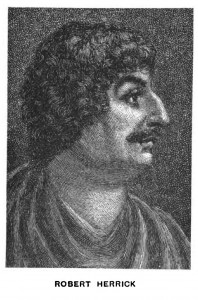 A lyric poet and cleric who lived through the turmoil of the English Civil War, Robert Herrick was born in Cheapside in London in 1591. When he was just one year old, his father died after a fall from a window. The young Herrick was educated at the Merchant Taylor’s School before, at the age of 16, going to work as an apprentice for his uncle.
A lyric poet and cleric who lived through the turmoil of the English Civil War, Robert Herrick was born in Cheapside in London in 1591. When he was just one year old, his father died after a fall from a window. The young Herrick was educated at the Merchant Taylor’s School before, at the age of 16, going to work as an apprentice for his uncle.
The apprenticeship last just a few years before Herrick went to college, graduating late in 1617. He became one of the followers of poet Ben Jonson, one of the so called Sons of Ben, writing several poems to him before becoming ordained into the church in 1623 and moving to Devon-shire where he became vicar at Dean Prior. Whilst it is not known what happened to Herrick during the time before he moved to Devon, it’s often assumed that he had found something of a surrogate father in Ben Jonson and that it fueled his desire to write.
Herrick was a prolific poet, writing some 2,500 verses in his lifetime, many of which are still well-known today. While his early work was more earthy and often contained lines about love and the feminine body, his later poetry became ever more spiritual and concerned with the philosophy of life. His work is filled with direct language about how our lives are hopelessly short, that love is enduring and splendid, and that we all need to make the most of our time here.

During the Civil War he was removed from Dean Prior because he was sympathetic to the Royalists but was reinstated as vicar there when Charles II returned to the throne after the death of Cromwell. It must have been a difficult time for Herrick with his Royalist sympathies, educated at a London College and being friends with many of the rich and powerful people in England at the time. He had produced eulogies to Charles I in his main work Hesperides and was known to be a favorite of the King.
His time in the West Country had exposed him to puritan thought and he wrote several poems that derided the primitive nature of people in these communities who seemed to be removed from civilization and culture.
Throughout his lifetime Herrick never married though he often wrote about love and marriage and much has been made of the real or imaginary mistresses that have appeared in his work.

In his poems he covers a wide range of issues from social class, love, and the celebration of life itself. His work is characterized by a deep thought and artistic boldness that gives a broad snapshot of life in a time of great upheaval. Both realist and optimist he lived to see the monarchy restored and died at the age of 83 in 1674. At the time he was still the vicar of Dean Prior.

